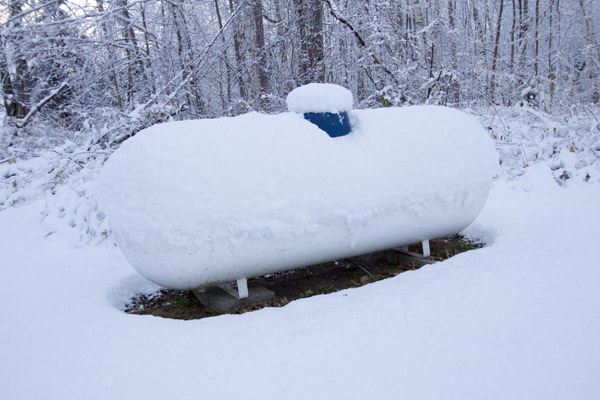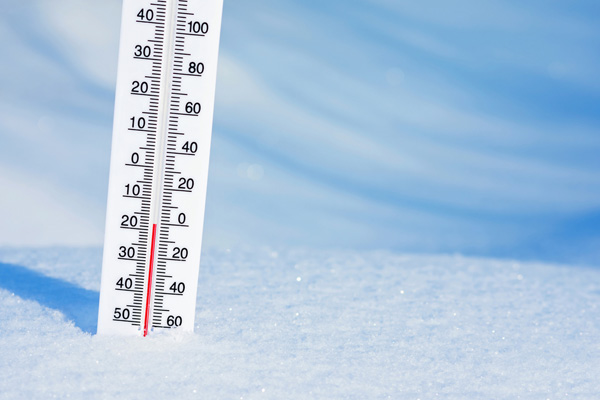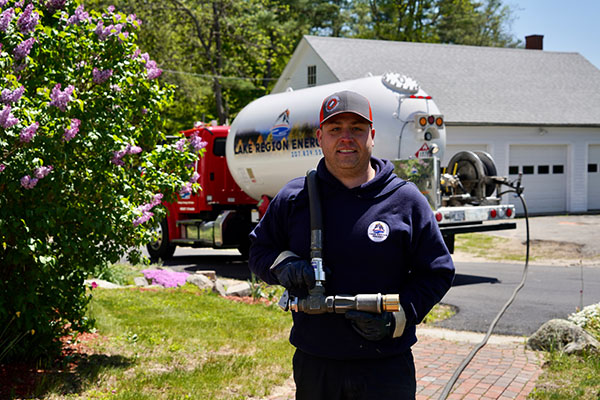Table of Contents
Residents might wonder about the viability of propane during the chillier months, questioning if it might freeze in extreme cold. Does propane freeze? Should this be a concern?
Rest assured, proactive measures can be taken to circumvent such situations. As a cleaner energy source, propane emits fewer carbon monoxide emissions than numerous other energy options. This establishes it as a commendable selection for those residing in more rural regions or places with limited energy infrastructure.
The following article will delve into propane’s behavior in low temperatures, highlighting key considerations and recommending effective measures for Lake Region Energy customers.
Is My Propane at Risk of Freezing?

The phenomenon of frozen propane is exceptionally uncommon. Consequently, at Lake Region Energy, we seldom receive feedback from our esteemed clientele regarding such concerns. Yet, it’s crucial to acknowledge that cold waves and intense winter seasons can influence their propane reserves.
The primary concern isn’t necessarily propane freezing but the unanticipated chain reactions cold weather can initiate, often catching residents off guard.
When Does Propane Actually Freeze?
Most homeowners’ apprehensions center around the freezing point of propane, given its frequent mention.
To be precise, propane’s freezing point is a staggering minus 187.7 degrees Centigrade or minus 306.4 Fahrenheit. This value remains consistent, irrespective of the storage conditions or location of the propane.
At this exceedingly low temperature, propane transitions into a solid state. This transformation is a root cause for the heightened concern since, in its solid form, propane cannot be transferred from storage tanks to households, barbecue setups, or auxiliary power sources, leaving one in a bind.
However, the actual freezing of propane is rarely the core issue. What might surprise many is the boiling point of propane, and this is where some misunderstandings can emerge.
Related Article: How Big Does My Home Propane Tank Size Need To Be?
Understanding Propane’s Boiling Point is More Crucial Than Its Freezing Point

For propane, the boiling point stands at minus 42 degrees Centigrade or minus 43.6 degrees Fahrenheit. This metric remains consistent, irrespective of where or how the propane is stored.
Residents must ensure that their propane storage tanks and the contained propane never plummet to these extreme temperatures.
Related Article: Why Is Propane Environmentally Friendly?
Why is the Boiling Point Significant for Propane Usage?
The boiling point demarcates the threshold at which propane fails to vaporize. Vaporization is pivotal for all propane applications, as it facilitates fuel combustion, delivering the requisite heat.
For Lake Region Energy customers, understanding this ensures that their heating systems receive an uninterrupted propane supply, standby generators are primed for operation during power outages, and those early morning swims remain refreshingly warm.
The Significance of Propane Tank Pressure
The pressure within propane storage tanks plays a pivotal role in their efficient operation. As external temperatures drop, the temperature of the propane inside the tank follows suit. This cooling effect makes the propane contract, thereby occupying a smaller volume. Consequently, a vacuum-like space emerges inside the tank, decreasing its pressure, often measured in PSI (Pounds per Square Inch).
Maintaining a PSI range between 100 to 200 is recommended for optimal functionality. A reading above this range can be considered elevated.
However, when the PSI dips below 100, propane faces challenges in sustaining its liquid state.
Lake Region Energy customers should be wary of this: a simultaneous drop in temperature and tank pressure might cause propane to edge toward solidification. Once solidified, propane’s flow through pipelines to heaters, stoves, or other linked utilities gets obstructed, hindering their performance.
Guidelines to Safeguard Your Propane Supply
Regularly Clear Snow and Moisture from the Tank’s Surface
Exposure to ambient moisture, precipitation, or freezing weather can affect propane tanks. This is especially true when accumulated snow melts and re-solidifies as icy patches or sleet on the tank’s exterior. Moreover, associated components like regulators and valves can be jeopardized during chilling temperatures.
During the winter months, make it a part of your daily routine to clear away any snow accumulation and moisture from around and on top of the tank. Proactively addressing this will negate the possibility of freezing due to the absence of snow or water.
Related Article: Questions To Ask When Choosing A Propane Company
Ensure a Consistent Propane Level

An almost empty tank, especially one at 70% depletion or more, grapples to uphold the requisite PSI for maintaining propane in its liquid state.
Dramatic temperature plunges, especially when coinciding with dwindling propane reserves, can swiftly result in a PSI drop. This imbalance disrupts the consistent propane flow to heating units, kitchen equipment, and generators, among other appliances.
By scheduling routine deliveries with Lake Region Energy, you can ensure that your propane storage tank remains adequately filled.
Shield Your Propane Tank
Implementing a non-electric cover for your storage tank can aid in preserving its warmth.
Considering an insulated blanket tailored to the tank’s dimensions might also be beneficial.
Both methods can thwart the onset of ice formation on the tank. However, residents are strongly advised against using heated blankets or any heated covers for safety reasons.
Ensure the Propane Tank Valve is Closed When Idle
Leaving a valve open inadvertently can lead to freezing complications. Moreover, this exposes the tank to the risk of freezing pipelines, which in turn can impact the tank’s internal temperature.
Simply making sure to close the valve when the propane isn’t actively being utilized can mitigate many challenges associated with cold weather. By adopting this practice, homeowners can prevent many potential winter-related issues.
In Summary
The likelihood of propane tanks freezing is relatively low, but the propane stored within can be susceptible to harsh weather conditions.
To ensure consistent and safe usage, residents can adopt certain practices. These include keeping the tank sufficiently filled, ensuring proper internal pressure, using covers for insulation, and diligently removing any accumulation of snow, water, or ice on the tank’s exterior.
As a final note, always remember to shut the valve when the propane tank is not in active use. This simple act guards against chilling temperatures and retains the optimal pressure inside, preventing the propane from reaching a solid state.

If you’re in need of outstanding propane delivery services within Maine and New Hampshire, Lake Region Energy is the name to trust. We pride ourselves on delivering superior quality fuel swiftly, affordably, and with a smile.
Consistently, Lake Region Energy has been the go-to choice for unmatched services. Call today to explore our varied delivery schedules and financing solutions.
Furthermore, we provide a comprehensive range of HVAC services to elevate your home’s comfort, improve indoor air quality, and enhance energy efficiency. Our offerings encompass heating and cooling system tune-ups, top-tier repairs, state-of-the-art installations, and more.
For more information about our propane deliveries and HVAC services, be sure to contact Lake Region Energy. You can click here to contact us, or you can call us at (207) 839-5500 to find out more. We offer a full line of heating and cooling repairs, maintenance services, and installations.
